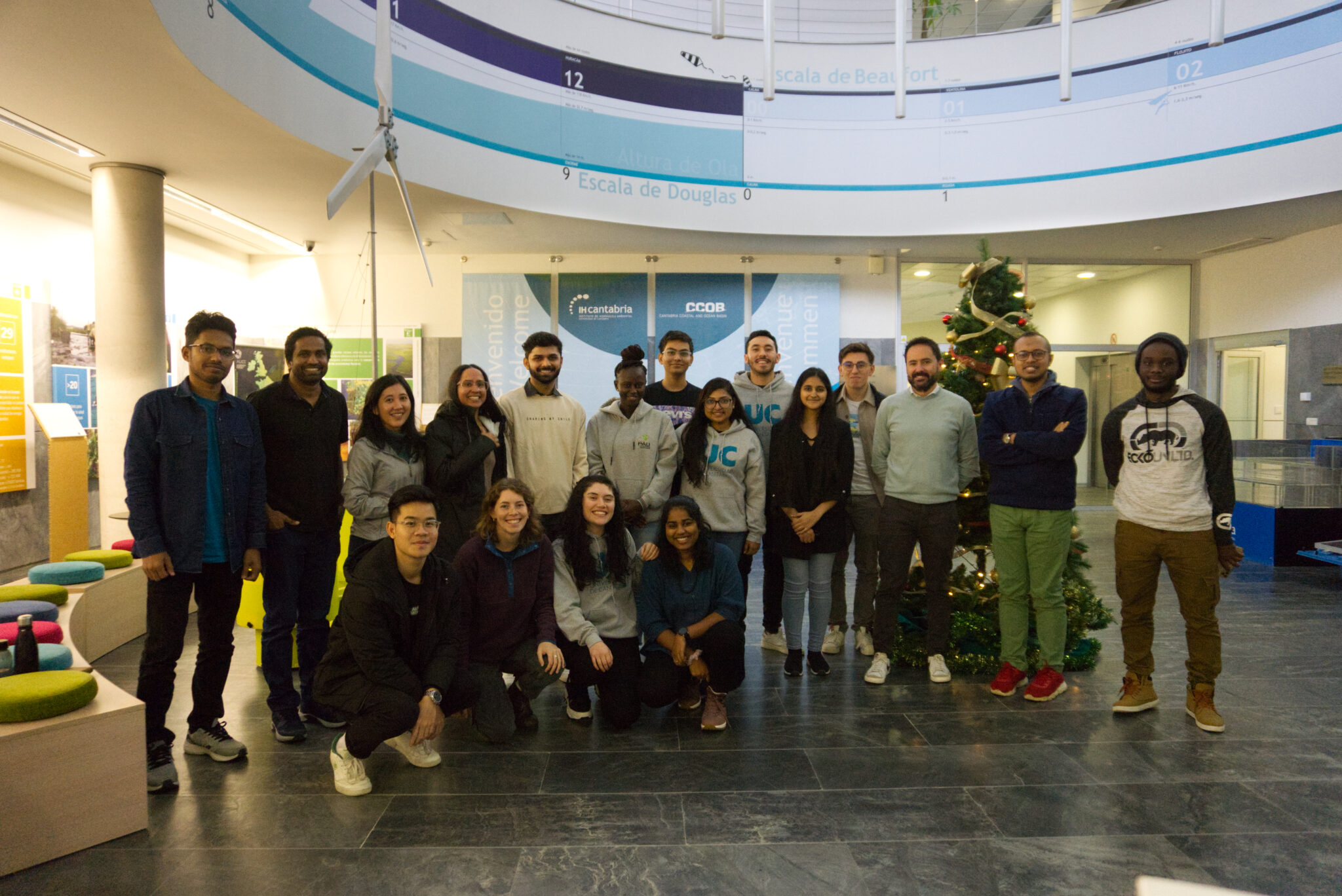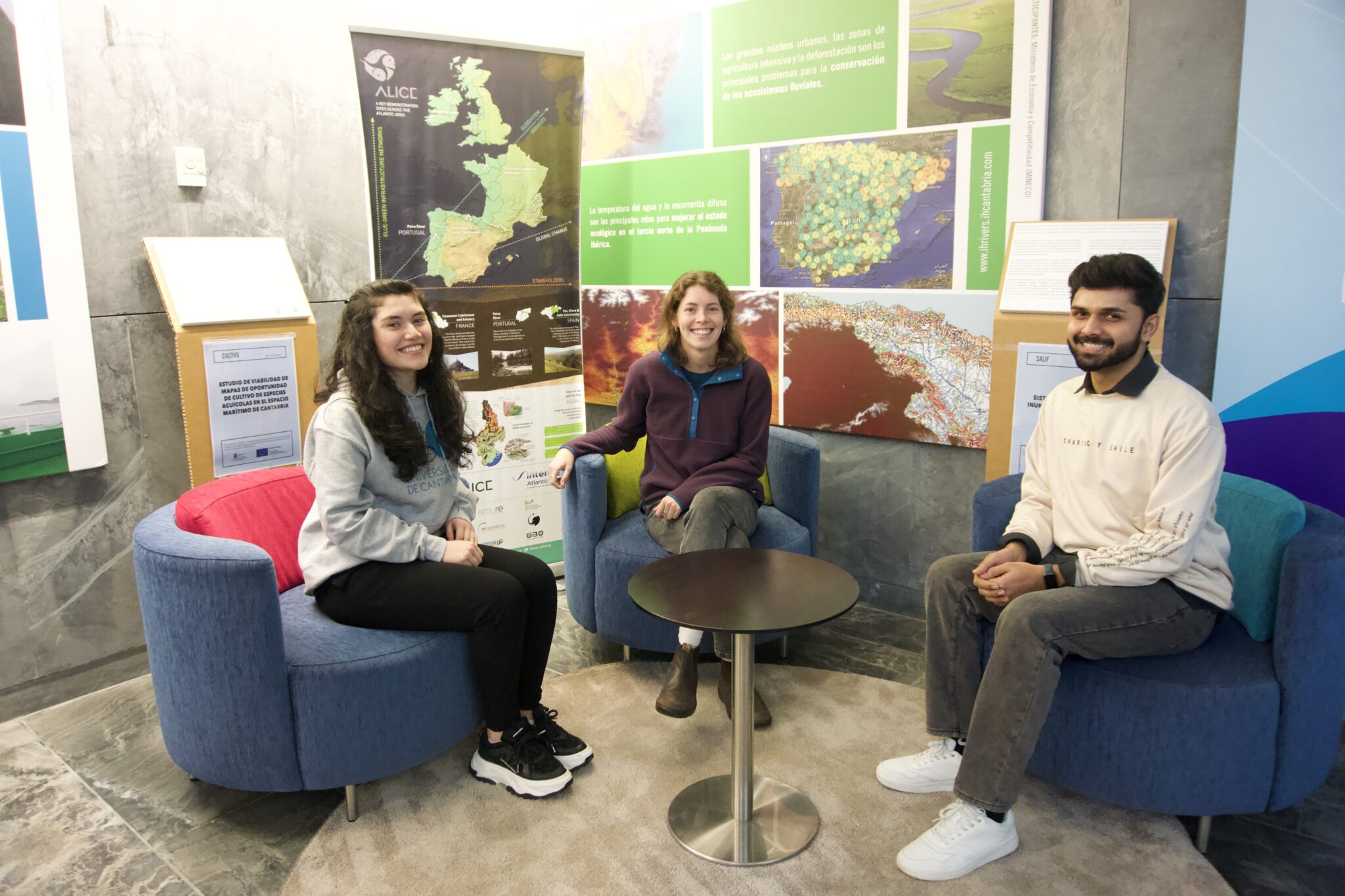IHCantabria receives the international group of students of the Erasmus Mundus COASTHAZAR Master’s programme

Photo of the group of 17 students of the Erasmus Mundus COASTHAZAR Master program, posing with Professor Javier L. Lara (third from the right), in front of the IHCantabria Christmas tree.
The group of 17 students who are studying the COASTHAZAR programme this semester come from several countries, including India, Colombia, Sri Lanka, Mauritius, Bangladesh, Pakistan, Jamaica, Indonesia, Canada, Gambia, and Vietnam.
The Institute of Environmental Hydraulics of the University of Cantabria(IHCantabria) received this week an international group of 17 students who are studying in the Erasmus Mundus Master’s programme “Coastal Hazards, Risks, Climate Change Impacts and Adaptation” (COASTHAZAR). This visit was coordinated by Professor Javier L. Lara, who is in charge of the Climate Risk, Adaptation and Resilience Group at IHCantabria, as well as coordinator of the master’s program on behalf of the Universidad de Cantabria (UC).
COASTHAZAR is a master’s programme taught by a consortium of universities, coordinated by the IHE Delft Institute for Water Education (The Netherlands), in addition to the Universidad de Cantabria (Spain) and the Universidade do Algarve (Portugal).
This group of 17 students, who are studying COASTHAZAR this year students and who belong to the second edition of this Erasmus Mundus Master’s programme, come from different countries, including India, Colombia, Sri Lanka, Mauritius, Bangladesh, Pakistan, Jamaica, Indonesia, Canada, Gambia, and Vietnam. This semester began the execution of this master’s program at the E.T.S. de Ingenieros de Caminos, Canales y Puertos of the UC; subsequently, the studies will continue at the IHE Delft Institute for Water Education and at the Universidade do Algarve.
One of the students in this master’s programme is Dana Pothier, who studied civil engineering at the University of Ottawa (Canada). Why did she decide to study this master’s programme and what is her goal, after her studies? “My goal in coming to study this master’s programme was to develop my technical skills and knowledge related to coastal hazards, risks, climate change impacts, adaptation and coastal engineering, and to return with this experience to Canada, in order to help with the development of strategies to protect the people of my country against storm events, among other situations experienced in coastal areas there”.
Hassan Ilyas is a Pakistani student, who studied civil engineering at the University of Engineering and Technology, Lahore (UET Lahore). He says that his experience in Santander has been “fantastic”, because “studying with students from 10 different countries is great and because the facilities offered by the Universidad de Cantabria have made my experience here much easier and more satisfactory”.
Marcela Simbaquebar, who previously studied environmental engineering at the Universidad El Bosque, in Colombia, says that if she had the role of ambassador of the COASTHAZAR master’s programme, she would recommend it because, “in addition to being a multicultural programme, it allows you to meet people from other countries, learn about their traditions and incorporate that into your future. It is a unique programme that offers the possibility of learning from expert institutions at an international level. Therefore, in addition to growing professionally, this master’s programme offers the opportunity to grow personally, in different areas of life”.
The students of the first edition, who began their studies in September 2022, will begin writing their Master’s Thesis in January. Of the 20 students of that first edition, seven students – who come from Nigeria, Turkey, the United States, Jamaica and Indonesia – will return to the Universidad de Cantabria.
Importance of Internationalization in the University of Cantabria
The international presence is growing at the Universidad de Cantabria, with approximately 5% of foreign students at present, which consolidates this university as a destination of academic excellence and cultural diversity.
Erasmus Mundus master’s programmes are characterized by their academic excellence and their integration among multiple European educational institutions, as these programmes offer the opportunity to pursue a postgraduate education at several partner universities in Europe, thus enhancing the value of the degree.
In addition to enhancing academic quality, Erasmus Mundus master’s programmes – such as COASTHAZAR – facilitate internationalization and the dissemination of European cultural values, with highly qualified students coming from several countries.

From left to right: Marcela Simbaquebar (Colombia), Dana Pothier (Canada) and Hassan Ilyas (Pakistan).



